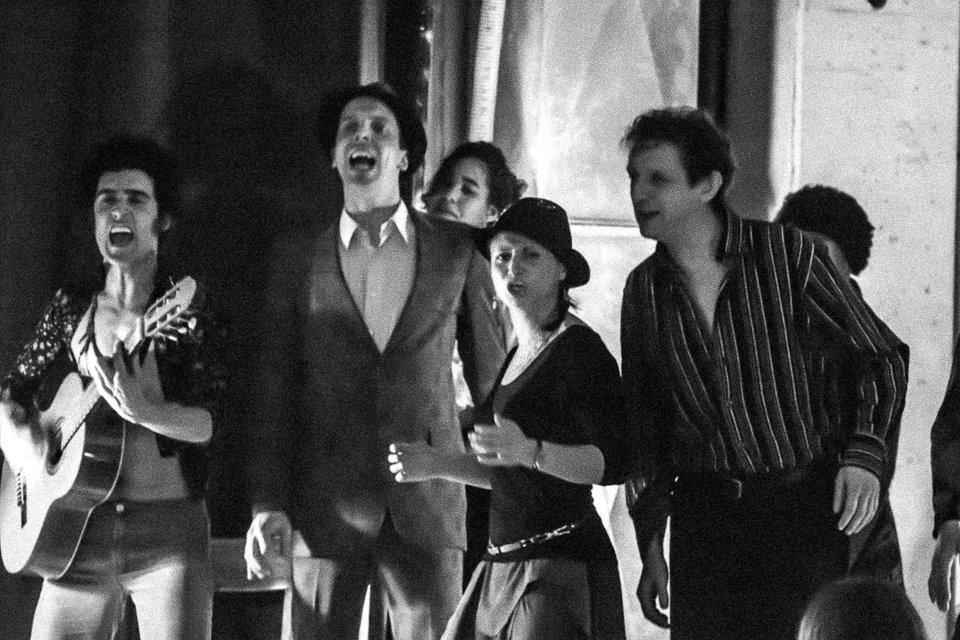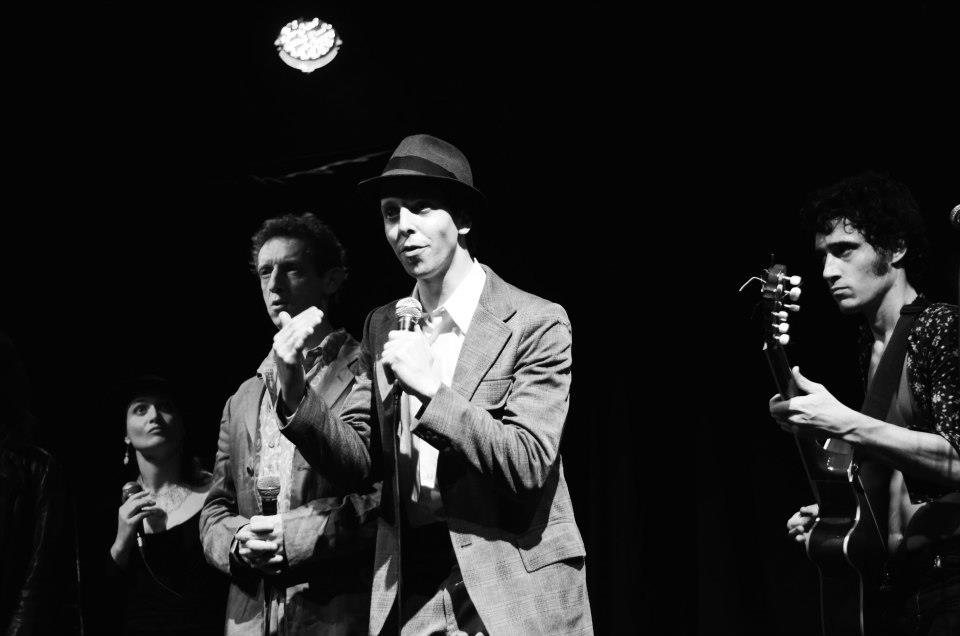Mario Biagini is a man who believes in the power of the word—spoken, recited, sung. As a performer and director he has brought together 9 performers—musicians, singers, actors—to travel to Yale and New Haven as part of Interdisciplinary Performance Studies at Yale (IPSY). Biagini’s group, originating in the Open Program of the Workcenter of Jerzy Grotowski and Thomas Richards, pride themselves on a collective approach to performance that aims to include its audience, creating an environment that feels like “a holiday, a relaxation” of our routine responses.

While in New Haven, the troupe will perform a show called Electric Party Songs, twice at Yale’s Calhoun College, Feb. 22 and 23, and, in a more extended version, at BAR, March 3—the latter show is billed as “an experiment in the potentialities of a party as an art form.” If your winter has been as low on energy as mine, you too might find yourself intrigued by that idea.
The troupe will also perform I Am America at the Whitney Theater in the Whitney Humanities Center, with a set built by children at the Eli Whitney Museum, Feb. 28 and March 1, and will hold a symposium on Poetry as a Practice of Encounter, also at the WHC, on March 2.
The Open Program likes to include the contribution of locals in their shows, using materials found in the streets of the different cities they visit, and at times, as in Italy, have set out to create self-generated festivals in the streets. Traveling about New Haven by bus, Biagini noted the racial segregation of New Haven where almost all bus riders are black and almost all students at Yale are white. He told his collaborators: “we should do our show right here on the bus.” Instead, he does his best to engage people wherever he finds them, offering a kind of contact high from his joy in performance.
The performances consist of an unusual mix: selections from the poems of Allen Ginsberg—the late Beat Guru, Bop Buddist, Singalong Shaman and Clown Prince of Poetry—are turned into songs and are then intermixed with African American spirituals, shouts, and worksongs. The mix is thoroughly American, as Ginsberg is perhaps the poet of the last 60 years most concerned with trying to live up to “America” in a Whitmanian sense. Whether or not he succeeded, Ginsberg was astute at assessing the kinds of mash-ups that drive our national psyche. He was into jazz, rock, folk, blues, as well as dipping into most religions, particularly Judaism via his upbringing and Buddhism via his own searches into mysticism. He also participated readily in the cults of personality that float so many boats in the media, and could make pop culture read like holy texts.
Some of the best moments in Electric Party Songs come from the performers’ grasp of the essential showmanship at the heart of Ginsberg’s poetry (Lloyd Bricken, looking a bit Waits-like, is particularly effective in his delivery). Ginsberg’s work is about exposure—of the highest self, of the lowest urges, of the deepest shame and the most inspiring ecstasies. The troupe does not offer reverential recitals, but rather dynamic musical numbers that bounce off Ginsberg’s lines, making the songs assume a bodily urgency—whether it’s Biagnini recreating an old and infirm poet or Alejandro Tomás Rodriguez writhing about on the floor to the yearnings of love.
Add to that the spirituals—with many rhythmic shout-outs to Jesus—and you have a kind of revival meeting that may make all feel either welcome or uncomfortable. These lithe and sinuous young men and women sing gracefully a capella (Felicita Marcelli and Agnieszka Kazimierska ) or with the accompaniment of guitars and percussion, and to see them up and swaying to songs from the South is to harken to a kind of cultural trance and transcendence. How are these predominantly European performers—from Italy, Poland, France and elsewhere, looking like an ad hoc collection of gypsies and free spirits—able to lose themselves so readily in traditional songs? And what is the principle force behind the vibe they create like a band of charismatics?
Biagini likes to think back to the farm he grew up on in Italy, where a holiday was a true transformation. People knew the value of letting down their guard, of giving up their daily tasks for a collective enjoyment of the free flow of time. His group has sometimes staged a “night watch” where the audience and the performers stay together through the night, interacting, singing, playing, sleeping, moving about freely, finding themselves, in the end, not the same as they were when it began. He believes fervently that letting music and poetry, lyrics and rhythms inhabit one is to liberate—at least for a little—the spirit.
The spirit—that’s the place where the poet Ginsberg meets the songs of faith amidst oppression. And that’s where Biagini and his troupe try to meet their audience. It may take a leap of faith to get beyond your New England reticence and intellectual skepticism on a cold February night—but it might just be worth the effort.
Interdisciplinary Performance Studies at Yale presents The Open Program of the Workcenter of Jerzy Grotowski and Thomas Richards
Electric Party Songs: Feb. 22 & 23: 8pm, Calhoun Cabaret, 189 Elm Street
I Am America: Feb. 28 & March 1: 8pm, Whitney Theater, 53Wall Street
Symposium: Poetry as the Practice of Encounter: March 2: 11 am-4pm, Whitney Theater, 53Wall Street
Electric Party Songs: March 3: 4 pm, BAR, 254 Crown Street
Events are free and open to the public. Seating is limited.

